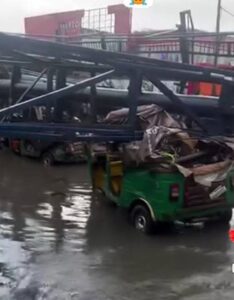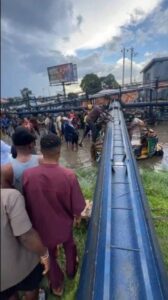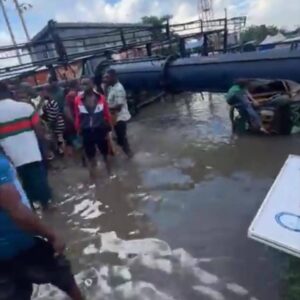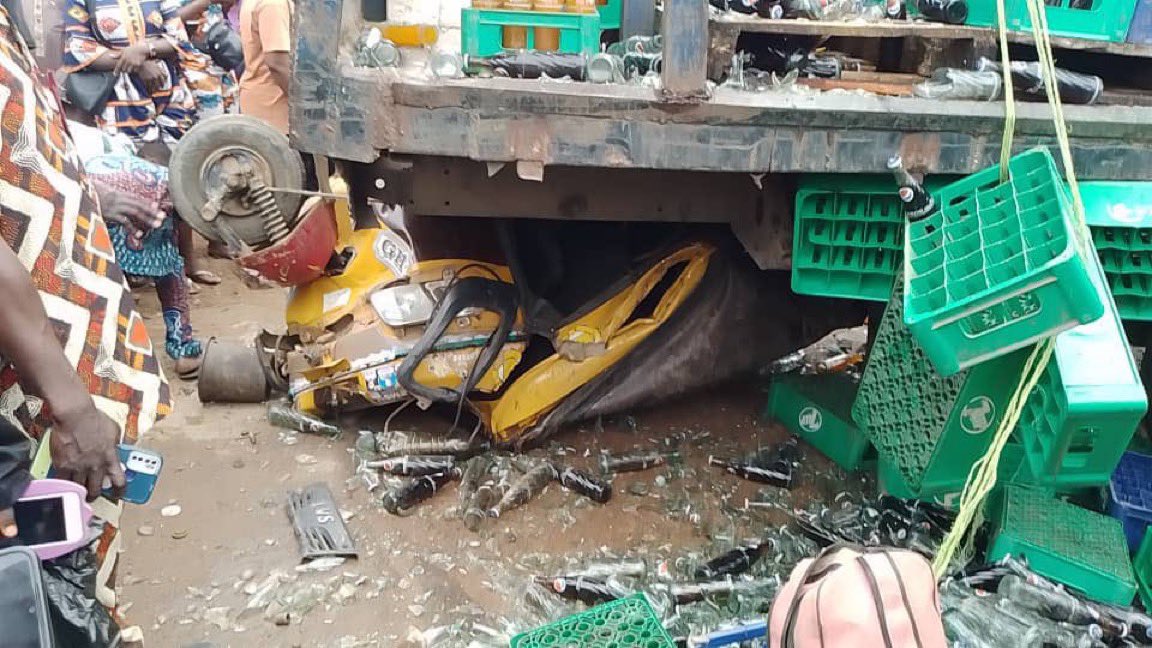A catastrophic incident unfolded yesterday at the bustling Salad Market junction along the Aba-Owerri Road, near the GIA Event Centre, when a towering advertising billboard collapsed during a fierce rainstorm, crushing several commercial tricycles, locally known as Keke Napeps. The tragic event, which occurred in the early evening amidst heavy downpour and gusting winds, left one person dead, seven others injured, and a community grappling with shock and grief. The collapse, attributed to shoddy construction and a weak foundation, has sparked outrage and raised urgent questions about public safety and infrastructure standards in one of Nigeria’s most vibrant commercial hubs.
The victim, identified as 27-year-old Destiny Uguru from Izzi, Ebonyi State, was killed instantly when the massive structure came crashing down, flattening the tricycle he was in. Eyewitnesses described a scene of chaos and panic as the billboard, unable to withstand the relentless winds, toppled onto the busy road below, trapping multiple tricycles and their passengers under its weight. “It was like something out of a movie,” said Chinedu Okoro, a local shopkeeper who witnessed the incident. “The rain was heavy, the wind was howling, and then we heard this loud crash. People were screaming, running to help, but the debris was so heavy.”

Emergency responders, alongside local residents, worked frantically to free those trapped beneath the twisted metal and shattered panels. Seven individuals sustained injuries, with five requiring immediate treatment at Abia University Teaching Hospital. According to hospital officials, two of the injured have since been discharged, while the remaining three continue to receive care for injuries ranging from fractures to severe lacerations. The Abia State Government, through the Abia State Signage and Advertising Agency (ABSAA), has pledged to cover the medical expenses of all victims, a move aimed at alleviating the financial burden on the affected families.

Preliminary investigations point to structural failures as the primary cause of the collapse. Engineers and industry experts have criticized the billboard’s construction, noting that it was built on a weak foundation with inadequate soil testing. “The base of the billboard was not properly anchored,” explained Engr. Chukwuma Nwosu, a structural engineer based in Aba. “In a city like Aba, where heavy rains and strong winds are common, billboards must be designed to withstand these conditions. This was a disaster waiting to happen.” The billboard, reportedly owned by a private advertising firm, had been a prominent feature at the junction, displaying colorful ads for local businesses. However, residents claim that concerns about its stability had been raised in the past, only to be ignored.
The collapse also caused significant collateral damage, bringing down high-tension electricity wires and plunging the surrounding area into darkness. Aba Power Limited Electric (APLE), the local electricity provider, has stated that power restoration efforts are underway but could take several days due to the extent of the damage. The loss of electricity has further disrupted businesses in the area, adding to the economic toll of the incident in a city already navigating the challenges of Nigeria’s economic climate.

Local residents and commuters have expressed outrage over the incident, with many calling for stricter regulations on billboard construction and maintenance. “This is not the first time something like this has happened,” said Amaka Nwankwo, a trader at Salad Market. “These billboards are everywhere, and nobody checks if they’re safe. How many more people have to die before something is done?” The sentiment reflects a broader frustration with lax oversight in Nigeria’s rapidly growing urban centers, where advertising billboards have become ubiquitous but are often erected with little regard for safety standards.
In response, the Abia State Government has vowed to conduct a thorough investigation into the incident. ABSAA, the agency responsible for regulating signage in the state, has promised to review the construction permits and maintenance records of all billboards in Aba and beyond. “We are deeply saddened by this tragedy,” said an ABSAA spokesperson in a statement. “We will ensure that those responsible are held accountable, and we are committed to preventing such incidents in the future.” The agency has also urged residents to report any billboards that appear unstable or poorly maintained.
The incident has cast a spotlight on the broader issue of urban planning and infrastructure safety in Nigeria. Aba, a commercial nerve center known for its thriving markets and entrepreneurial spirit, has long struggled with inadequate infrastructure, from poorly maintained roads to unreliable electricity. The billboard collapse serves as a stark reminder of the consequences of neglecting safety standards in pursuit of commercial gain. Community leaders are now calling for a comprehensive audit of all public structures in the city, including billboards, bridges, and buildings, to prevent future tragedies.
For the family of Destiny Uguru, the loss is immeasurable. Friends described him as a hardworking young man with dreams of starting his own business. “He was always smiling, always full of life,” said his cousin, Emeka Uguru. “This is a pain we will carry forever.” A candlelight vigil is being planned in his memory, with community members gathering to honor his life and demand justice for the victims.
As Aba mourns, the incident has sparked a broader conversation about accountability, safety, and the need for systemic change. The collapsed billboard, now a twisted heap of metal at Salad Market junction, stands as a grim symbol of what happens when oversight fails. For now, the city waits for answers—and for assurances that such a tragedy will not strike again.
Join our Whatsapp channel to stay updated always!


